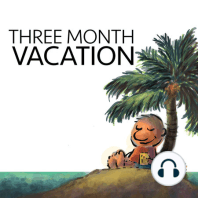21 min listen

Rapid Talent (How To Get There and What Holds Us Back)
Rapid Talent (How To Get There and What Holds Us Back)
ratings:
Released:
Nov 25, 2016
Format:
Podcast episode
Description
Why do others seem more talented than we are? Is talent innate? Is it just practice? Or is there something else. Incredibly the key to talent is in the way you define talent. Change the definition and you see it in a whole new light. In Part 1 of this episode on talent, you’ll see how mere definitions change the way you see the world of talent (and how it can get you talented faster than before). Additional rocket launch audio recordings used in this episode are courtesy of NASA (https://www.nasa.gov/) ----------------- In this episode Sean talks about Part 1: Our battle with talented people. Part 2: Is talent a reduction of errors? Part 3: What has “Austin’s Butterfly” got to do with talent. ----------------- 7 miles per second That’s what it takes for a spacecraft to break out of Earth’s orbit. Breaking free of the gravity of Earth and heading into space is called “Escape Velocity” and is easily one of the biggest challenges of space travel. The spacecraft needs an enormous amount of fuel to break free of Earth’s gravity. And yet, that very fuel adds to the weight of the rocket. The more fuel you have, the more thrust you achieve, but the fuel also adds to the weight of the rocket. It’s almost a maddening Catch 22 situation that scientists have been trying to solve for ages. And it also drives us crazy when we look around us and see people who are clearly more talented than us We had this problem in school. Some kids were brilliant at writing and others that excelled in maths. As we grew up, we noticed people who sang better, danced better, are better artists, speakers, pick up languages faster than we could ever imagine. And then we brush it off We believe we were born with certain skills and it’s best to use them to our fullest capacity. The gravity of our situation holds us back. That’s not the way scientists look at gravity. For them, gravity is a challenge. Achieving “escape velocity” is simply a matter of breaking through what holds us back. It’s always about how to go at 7 miles per second in the most efficient manner possible. What you’re about to read is my battle with talent. You may already know of some of my skills. Writing, drawing, teaching, painting, cooking—that’s what you might have seen. You may not know that I’m also an excellent babysitter, dance exceedingly well, learn programs at very high speed and know more than six languages. And the reason I’m stating all of this isn’t to impress you. In fact, it’s the reason why I started studying the science of acquiring talent back around the year 2008. I’d be sitting at the cafe, and someone would come up to me and tell me how I was “talented” at drawing. I’d be on the dance floor, and I’d get a compliment about how well I danced. Compliments are amazing. They were my Jamba Juice. They spurred me on to get a lot better. But they also drove me crazy. It almost seemed like people were suggesting I was born with the skill. And so I started on an uphill climb. To prove that innate talent may not exist. In reality, I don’t care whether it exists at all. But it wasn’t easy to say it out aloud because the very concept of acquiring talent seems improbable. “Not everyone can be Michael Phelps,” they tell me. Not everyone can be Albert Einstein. The funny thing is I love pushback I love it that people kept putting objections in my way because somehow I had to prove beyond any doubt that talent could be acquired. What made the challenge even more interesting was the concept of 10,000 hours. I was determined to prove that you have didn’t need anything remotely close to 10,000 hours to acquire a very high level of skill. But you don’t have to believe me—well, not right away. All I’m asking you to do is listen to three definitions of talent. And then I’ll have made that little dent in your universe. Or at least that’s the theory. So let’s get down to the nitty-gritty of talent and see why mere definitions can make you see the world the way I see it. It might even make you a
Released:
Nov 25, 2016
Format:
Podcast episode
Titles in the series (100)
Why We Sell Less: The Root of Confidence: The hardest thing in business?or life is the factor of confidence. Whether you're in online marketing, selling products or services, or run a physical store, the confidence goes up and down. And yet, confidence is what creates sales. Sales, after all,... by The Three Month Vacation Podcast